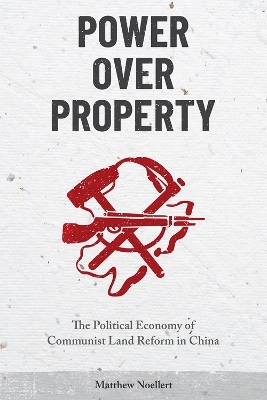
Power over Property
The Political Economy of Communist Land Reform in China
Seiten
2020
The University of Michigan Press (Verlag)
978-0-472-13211-9 (ISBN)
The University of Michigan Press (Verlag)
978-0-472-13211-9 (ISBN)
Following the end of World War II in 1945, the Chinese Communist Party (CCP) spent three decades carrying out agrarian reform among nearly one third of the world's rural population. This book presents a new perspective on the first step of this reform, when the CCP helped redistribute over 40 million hectares of land to over 300 million peasants.
Following the end of World War II in 1945, the Chinese Communist Party (CCP) spent the next three decades carrying out agrarian reform among nearly one third of the world's rural population. This book presents a new perspective on the first step of this reform, when the CCP helped redistribute over 40 million hectares of land to over 300 million impoverished peasants in the nation-wide Land Reform Movement. This Land Reform, the founding myth of the People's Republic of China (1949-present) and the cornerstone of the Chinese Communist Revolution, embodies the idea that an equal redistribution of property will lead to social and political equality.
Through the systematic analysis of never-before studied micro-level data on practices of Land Reform in a complete county of over 500 villages, Power Over Property argues that in practice, the opposite occurred: the redistribution of political power led to a more equal or fair distribution of property. Despite its name, China's Land Reform primarily involved the removal of former power holders, the mobilization of mass political participation, and the creation of a new social hierarchy. Only after accomplishing all of this was it possible to redistribute land. On the eve of Land Reform, much of the Chinese countryside was under the control of predatory local strongmen who used their official position to monopolize both public and private resources. During Land Reform, the CCP allied with the rural majority to forcibly remove these strongmen and organize more democratic local government. At the end of Land Reform, this local government helped create a new social hierarchy that was not necessarily more equal, but more just, at least in the eyes of the majority.
Today the ideal of equalizing wealth to achieve social equality continues to appeal to people around the world living in the midst of widespread inequality, but the experience of China's Land Reform suggests this ideal is misguided. On the one hand, social equality in China was achieved through political, not economic means. On the other hand, moreover, the fundamental solution was not equality, but a more effective hierarchy of unequal, but fair, entitlements. This book ultimately suggests that focusing on economic equality may obscure more important social and political dynamics that have played a larger role in the development of the modern world.
Following the end of World War II in 1945, the Chinese Communist Party (CCP) spent the next three decades carrying out agrarian reform among nearly one third of the world's rural population. This book presents a new perspective on the first step of this reform, when the CCP helped redistribute over 40 million hectares of land to over 300 million impoverished peasants in the nation-wide Land Reform Movement. This Land Reform, the founding myth of the People's Republic of China (1949-present) and the cornerstone of the Chinese Communist Revolution, embodies the idea that an equal redistribution of property will lead to social and political equality.
Through the systematic analysis of never-before studied micro-level data on practices of Land Reform in a complete county of over 500 villages, Power Over Property argues that in practice, the opposite occurred: the redistribution of political power led to a more equal or fair distribution of property. Despite its name, China's Land Reform primarily involved the removal of former power holders, the mobilization of mass political participation, and the creation of a new social hierarchy. Only after accomplishing all of this was it possible to redistribute land. On the eve of Land Reform, much of the Chinese countryside was under the control of predatory local strongmen who used their official position to monopolize both public and private resources. During Land Reform, the CCP allied with the rural majority to forcibly remove these strongmen and organize more democratic local government. At the end of Land Reform, this local government helped create a new social hierarchy that was not necessarily more equal, but more just, at least in the eyes of the majority.
Today the ideal of equalizing wealth to achieve social equality continues to appeal to people around the world living in the midst of widespread inequality, but the experience of China's Land Reform suggests this ideal is misguided. On the one hand, social equality in China was achieved through political, not economic means. On the other hand, moreover, the fundamental solution was not equality, but a more effective hierarchy of unequal, but fair, entitlements. This book ultimately suggests that focusing on economic equality may obscure more important social and political dynamics that have played a larger role in the development of the modern world.
Matthew Noellert is Assistant Professor of History at the University of Iowa.
| Erscheinungsdatum | 02.10.2020 |
|---|---|
| Reihe/Serie | China Understandings Today |
| Zusatzinfo | 24 figures, 22 tables, 14 maps |
| Verlagsort | Ann Arbor |
| Sprache | englisch |
| Maße | 152 x 229 mm |
| Gewicht | 333 g |
| Themenwelt | Geisteswissenschaften ► Geschichte ► Regional- / Ländergeschichte |
| Sozialwissenschaften ► Politik / Verwaltung | |
| ISBN-10 | 0-472-13211-3 / 0472132113 |
| ISBN-13 | 978-0-472-13211-9 / 9780472132119 |
| Zustand | Neuware |
| Haben Sie eine Frage zum Produkt? |
Mehr entdecken
aus dem Bereich
aus dem Bereich
Erinnerungen
Buch | Softcover (2024)
Pantheon (Verlag)
16,00 €


